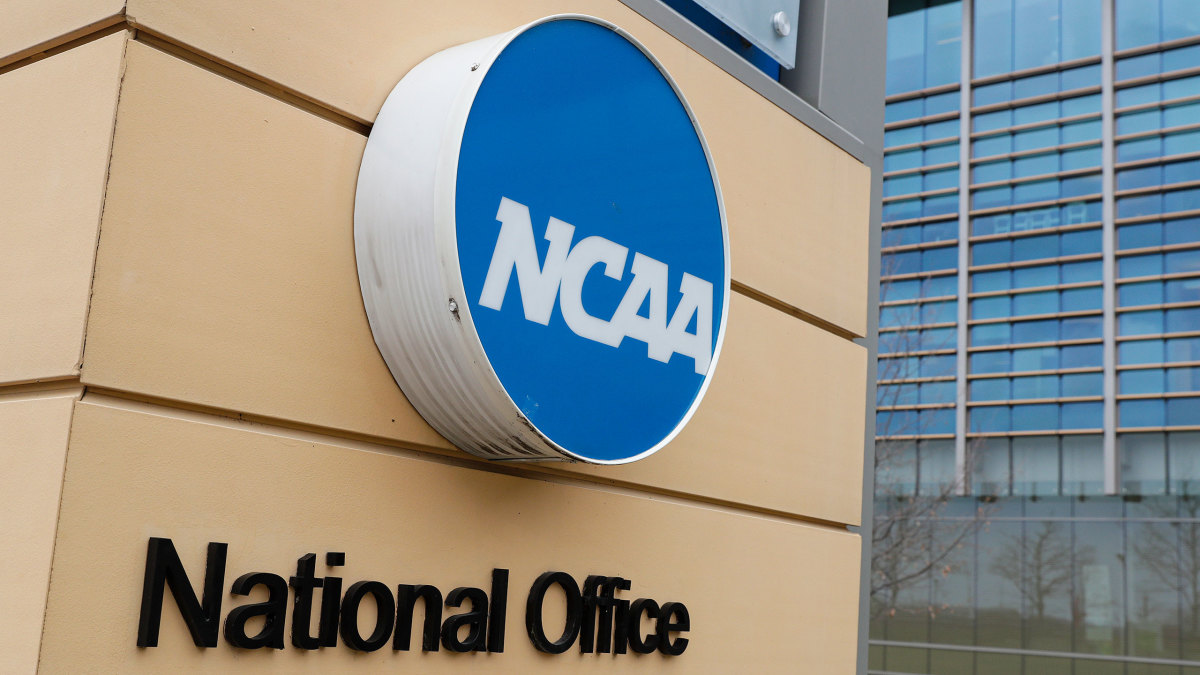Why an Air Force Infractions Case Could Be Key to Speedier NCAA Resolutions
The NCAA announced Thursday that the Air Force Academy agreed to an extensive set of Level I recruiting sanctions for violations committed during the COVID-19 dead period. But the broader news is how the infractions case has been adjudicated, and what it means for others going forward.
The “bifurcated case” produced a negotiated resolution and sanctions for the school and four coaches, while also allowing for the case to proceed to a Committee on Infractions hearing for a fifth coach who is disputing some of the findings. This gives closure to most involved parties, instead of keeping everyone waiting as the contested part of the case plays out over the coming months.
Ultimately, it’s part of the feedback last month from the NCAA transformation committee to speed up the association’s dawdling infractions process.
Matt Mikrut, managing director for the NCAA’s Office of the Committee on Infractions, tells Sports Illustrated that using a bifurcated case structure is one of several modifications that are “focused on timeliness and efficiency of the infractions process, as well as holding actors accountable as close as possible to the time when the conduct occurred.”

Although the bifurcated case alternative has been in the NCAA bylaws previously, it has rarely been used. The Air Force case provided something of a test case for implementing it more prominently among the methods for expediting a resolution.
“There was an expressed desire to allow multiple resolution paths within a case,” Mikrut said. “… Parties that want to hold themselves accountable will admit that violations occurred and agree to appropriate and meaningful penalties. This will allow them to go ahead and move on past the violations. Other parties might want to, quote-unquote, have their day in court and present their side of the facts.”
Air Force had 24 prospects on campus in a coordinated effort to circumvent the NCAA’s recruiting dead period during the pandemic. There have been several infractions cases pertaining to recruiting violations during that time (most recently one involving an LSU assistant football coach), but this is the first one to result in a Level I charge—the most significant in the NCAA’s violation hierarchy.
Air Force’s cooperation with the NCAA in the investigation, and disciplining its involved staff members, helped mitigate penalties. The list of sanctions announced Thursday: two years probation and an obligatory fine; a reduction of 46 total official visits for the football program during the 2022–23 and ’23–24 academic years; no unofficial visits for football from Sept. 1 through Oct. 12 of this year; no recruiting communications for football for four weeks during this academic year; a reduction in evaluation days for football by 10 last spring and by 34 this fall; a reduction of the football squad size by 10 for four years, starting this season; and show-cause penalties for the coaches who have agreed to their violations and penalties.
“The [committee] appreciates the parties’ efforts in working collaboratively together to reach agreement on the violations, levels, classifications, and significant and meaningful penalties,” said Gary Miller, chief hearing officer for the panel and president at Akron. “The panel also recognizes that Air Force has gone above and beyond in its overall approach to this case.”
Head coach Troy Calhoun overhauled his staff in the offseason, parting ways with several coaches reportedly involved in the violations. Among the former assistants is defensive line coach Bill Sheridan, who went on to Wisconsin but stepped down there last spring, shortly after the Air Force investigation became public.
Beyond efforts to accelerate the pace of cases, there are other significant changes coming to the infractions process in January: closing the loophole on head-coach responsibility, and increased transparency as cases wind their way through the process.
For decades, head coaches evaded sanctions for violations committed by their assistants by claiming they had no knowledge the violations were occurring. The NCAA tried to tighten that escape hatch by implementing a head-coach responsibility bylaw that held them accountable, but they were still able to argue (often successfully) for lesser penalties due to promoting an atmosphere of compliance or showing that they monitored their staff. Those arguments have essentially been removed; if a staff member is charged with a violation, so is the head coach.
“It’s now moving to strict liability,” Mikrut said. “Coaches can no longer argue they promoted an atmosphere of compliance and monitored their staff as a defense to the violation. But those arguments remain relevant for potential penalties.”
Whether that strict liability will be applied to ongoing cases that won’t be resolved until 2023 remains to be seen. In addition, that applicability to cases going through the Independent Accountability Review Process (IARP) is outside of the NCAA Committee on Infractions’ direct purview. (It could be particularly pertinent to the IARP men’s basketball cases not expected to be resolved until ’23, Kansas and LSU.)
In terms of increased transparency, the Committee on Infractions will borrow one of the few positive aspects of the IARP: its publicly accessible case dashboard. While not providing much in terms of details, it is a time line for events transpiring within a case—often showing a roadmap of the myriad delays that can lengthen case resolution.
“This would provide a bit more transparency, a little more information about where some hiccups might have been, in terms of delays, if there were any,” Mikrut said. That also would serve as a public defense for the NCAA from criticisms of the slow pace of resolution—lawyers for the school or involved individuals often are causing most of the delays.
More College Coverage:
• Memphis Let Off Easy in NCAA Probe
• What We Know—and Don’t Know—About CFP Expansion
• It’s Time for Georgia Tech to Hire a Black Coach
